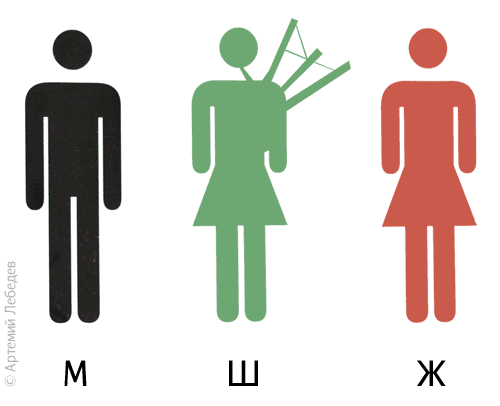Быть (predicate nouns)
The verb быть is also used in sentences with predicate nouns. What is a predicate? In copular sentences (“to be” type sentences), the subject is the thing you are talking about. The predicate is everything else:
| John wants to be a doctor. |
| John will be a doctor. |
| John was a doctor. |
| John is a doctor. |
A noun that is in the predicate is, cleverly enough, called a predicate noun. Predicate nouns in Russian normally occur in the instrumental case. The only exception is when it is directly a part of a present tense is/am/are phrase, in which case the predicate noun is in the nominative case.
| Иван хочет быть врачом. |
| Иван будет врачом. |
| Иван был врачом. |
| Иван — врач. |
Быть (location)
In Russian the most common verb for the “to be” concept is быть. It is imperfective in terms of meaning, but it is unique in that it is the only imperfective verb to have a simple future form:
| to be | |
| infinitive | быть |
| Past | был была было были |
| Present | - - (есть) - - (суть) |
| Future | буду будешь будет будем будете будут |
| Imperative | будь будьте |
Although быть has the present tense third person singular form есть and the present tense third person plural form суть, these are used only in specialized contexts. They aren't normally used to say things like “She is pretty” or “He was in Zvenigorod.” Instead you just leave the verb out in the present tense. Examples:
| В прошлом месяце мама была в Туле. | Last month Mom was in Tula. |
| Мама сейчас в Туле. | Mom is now in Tula. |
| Завтра мама будет в Туле. | Mom will be in Tula tomorrow. |
| Вчера мой брат был в командировке. | Yesterday my brother was on a business trip. |
| Мой брат сегодня в командировке. | My brother is on a business trip today. |
| Завтра мой брат будет в командировке. | My brother will be on a business trip tomorrow. |
| Где они были? | Where were they? |
| Мы сейчас на даче. | We are at our summer cabin at the moment. |
| Где вы будете завтра? | Where will you be tomorrow? |
Жаворонок, сова
In English we have several words for a person who likes to go to bed early and get up early: morning person, early riser, early bird. People who like to go to bed late and get up late are night people or night owls. If you go to a Russian dating service like http://russianwives4u.net or http://russianstuds4u.net (not that I myself have ever been to such a site), you may find that you have to specify whether you are an early bird or a night owl. The Russian equivalent of an early bird is жаворонок, literally a skylark, and the Russian equivalent of a night owl is сова, literally an owl. So you can fill out those parts of your dating profile like this:
|
Режим дня ☐ Я — сова.
☑ Я — жаворонок. |
Daily routine ☐ I'm a night owl.
☑ I'm an early bird. |
Волынка

I have never had a conversation in Russia about Scottish music, so I have never actually heard a Russian use the Russian word for bagpipe, which is волынка. Imagine my surprise when I came across a Russian website dedicated to bagpipes. The only thing I could think of that would be stranger would be an American website devoted to сало. Sample sentences:
| Волынка относится к числу наиболее древних музыкальных инструментов человечества. (source) | The bagpipe is among mankind's most ancient musical instruments. |
| — Твой брат всегда был глухим? — Нет, он оглох на концерте волынок. |
“Has your brother always been deaf?” “No, he lost his hearing at a bagpipe concert.” |
| У бабушки на даче раньше были тараканы, но как только она начала играть на волынке, так называемая музыка их выгнала всех. | Grandma's summer house use to have cockroaches, but as soon as she started playing the bagpipe, the so-called music drove them all away. |
Last Saturday I was at a concert starring the famous Bulgarian musician Theodosii Spassov, and to my great surprise right in the middle of his band was a guy playing the bagpipe. Who knew the Bulgarians had bagpipes? And about an eighth of the time he played the bagpipe while standing on one leg, drawing the other up either to practice yoga or support the bag. If you have any idea why a piper stands on one leg while piping, please let me know in the comment section.
It turns out that the Turks also have bagpipes, which they call tulum. The Czechs have bagpipes. The Spanish and Galicians have bagpipes. The Hungarians have bagpipes. The Italians have bagpipes. Even the Poles have bagpipes! What's even odder is that the Poles have nearly half a dozen words for the instrument, depending just where you are in Poland.
| bg | гайда |
| de | die Sackpfeife, der Dudelsack |
| es | gaita |
| fr | la cornemuse |
| pl | dudy, koza, gajdy, sierszenki, kobza |
| tk | tulum |
Задавать/задать
One other verb that is used to express “to ask” is задавать/задать, literally “to pose.” It is used in conjunction with the noun вопрос, which means question. It is conjugated like this:
| to pose (a question) | ||
| Imperfective | Perfective | |
| Infinitive | задавать | задать |
| Past | задавал задавала задавало задавали |
задал задала задало задали |
| Present | задаю задаёшь задаёт задаём задаёте задают |
No such thing as perfective present in Russian. |
| Future |
буду задавать будешь задавать будет задавать будем задавать будете задавать будут задавать |
задам задашь задаст зададим зададите зададут |
| Imperative | задавай(те) | задай(те) |
The verb combines with the noun вопрос in the accusative case, and the person being queried shows up in the dative case:
| Милиционеры задали вопросы жертве грабежа. | The policeman asked the robbery victim questions. |
| Вчера мама задала мне очень интересный вопрос: если бы мы жили во Франции, какая у нас была бы жизнь? | Yesterday Mom asked me a very interesting question: if we lived in France, what would our life be like? |
| Джордж Беркли задал вопрос: «Издаёт ли падающее в лесу дерево звук, если его некому услышать?» | George Berkeley posed the question, “If a tree falls in a forest and no one is around to hear it, does it make a sound?” |
| Не задавай им вопросы о том, как они сидели при Брежневе. | Don't ask them questions about their imprisonment during Brezhnev's era. |
The quote by Berkeley is not very well known in Russia and does not yet have a generally accepted translation. It is so well known in the US that it spawns regular parodies, the most famous of which is “If a man speaks in the forest and there is no woman to hear him, is he still wrong?” That one has become so iconic that it is reproduced on t-shirts regularly.
Note: the stress on the perfective past tense forms sometimes varies from the stress here indicated.
<< 1 ... 118 119 120 ...121 ...122 123 124 ...125 ...126 127 128 ... 158 >>
